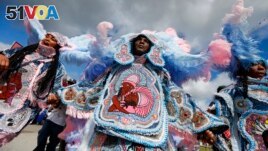Language experts estimate as many as 10,000 people still speak the French-based language Louisiana Creole.
In addition, many others in New Orleans and across the southern U.S. state consider themselves part of the culture that draws tens of thousands of people to events. The celebrations include autumn's Festival Acadiens et Creoles, summer's Creole Tomato Festival, and spring's Tremé Creole Gumbo & Congo Square Rhythms Festival.
But for locals and visitors alike, everyday evidence shows how strong Creole culture is in Louisiana. The state's performance spaces and airwaves are often filled with the driving, rhythmic sound of zydeco and other Creole and Cajun music. Louisiana's restaurants offer dishes with rich, complex flavors including gumbo, hot sausage, red beans and rice, and shrimp étouffée.

FILE - The Cheyenne and 7th Ward Creole Hunters Mardi Gras Indians are pictured at the New Orleans Jazz and Heritage Festival in New Orleans, May 4, 2017. (AP Photo/Gerald Herbert)
"To celebrate Creole culture is to wake up and live in New Orleans," said Christina Bragg. She is a member of the Mahogany Blue Babydolls, a parade group for Black and mixed-race women.
"Celebrating Creole is celebrating our day-to-day lives. The food we eat. The music we dance to. The way we gather with friends to parade during Mardi Gras," she said. "Every day I open my eyes and breathe, it's a celebration of Creole culture, because that's who I am."
Difficult to define
So, what is Creole?
"It's food, it's music, it's architecture, it's style and it's traditions," Mona Lisa Saloy told VOA. "There are millions of Creole people in countries across the world…we are all so much more alike than we are different. We create beautiful cultures everywhere we go, and I think that's evident here in Louisiana."
Saloy is the writer of the poetry collection Black Creole Chronicles and served as Louisiana's poet laureate from 2021 to 2023. She said Creole cultures all over the world have similarities to Louisiana's.
"Architectural styles common in New Orleans like the Creole Cottage or the Shotgun home can be found in other places with Creoles, such as in other parts of the American South and the Caribbean," she said. "Much of our music derives from the rhythms of Africa and the Caribbean, as does much of our food — elements of gumbo such as the long rice and okra, for example, or the prevalence of beans."
How the word "Creole" is defined changes from place to place and person to person.
The word "Creole" is believed to have come from the Portuguese word crioulo, which developed from the Latin word for "to create." Some say it was used in the European slave trade to describe a slave born in the New World and not in Africa. The word took on different meanings in different places. Creole in much of Africa and part of the Caribbean, for example, came to mean people of mixed ethnic or racial backgrounds.
In Louisiana, the definition has changed over the years.
"Here, the definition kind of depends on who you ask," said Vance Vaucresson. He is a New Orleans-based Creole and owner of a local restaurant, the Vaucresson Sausage Company.
"I prefer an inclusive definition," he said. "By that definition, anyone born in Louisiana could be Creole. During our colonial era, it was meant to differentiate people born in the Americas — usually of French, Spanish or African descent — from those born in Europe or Africa."
Describing his definition, Vaucresson added: "…it doesn't matter. If you're born here and embrace the culture, you can be Creole."
In Louisiana of the 1700s and 1800s, the more inclusive definition was possibly the most accepted. White people with European ancestry were just as likely to call themselves Creole as mixed-race people of African ancestry.
White Creoles claimed the term because it set them apart from settlers who were coming from Northern states after The Louisiana Purchase from France in 1803. Mixed-race Creoles, too, claimed the term because it differentiated them from enslaved people.
Don Vappie is a Creole jazz musician in New Orleans. He described the idea of Creole before the Civil war as organized into three levels. "It was more of a three-tier racial hierarchy here, instead of the two-tiered Black-or-white experienced elsewhere in the U.S," he said.
After the American Civil War, however, many of these differences in New Orleans disappeared.
"Creole or not, white people had more in common with white people and Black people had more in common with Black people," Vappie told VOA.
Saloy believes Creole is firmly connected to African culture and should stay that way.
"The ingredients in our food, the rhythm in our music and dance, the details in our architecture — it's all connected to West African culture," she said, "That's our heritage."
I'm Caty Weaver. And I'm Faith Pirlo.
Matt Haines reported this story for VOANews. Caty Weaver adapted it for Learning English.
_______________________________________________
Words in This Story
rhythmic –adj. having a regular sound or movement
dish –n. a kind of food that is prepared in a particular way
Mardi Gras (Fat Tuesday) –n. the Tuesday before the Catholic Lent religious observance
style –n. a particular way of designing something, doing some activity, or behaving
architectural –adj. related to the design of buildings
derive –v. to come from
prevalence –n. something that is widespread or usual
era –n. a period of time
tier –n. a level, especially one in an organization or a group
hierarchy –n. a system in which things are ordered by importance or status
ingredient –n. a material that is used to make something, especially food
